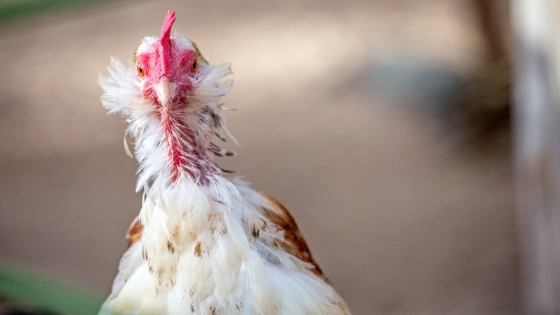There are several types of poultry lice and mite parasites that love infecting chickens. Primarily carried by visiting wild birds or rodents, they can also be introduced if you unknowingly add infected full-grown chickens to your flock, and they can tracked into the coop on shoes too.
You’ll want to be vigilant about poultry lice and mites. Not only can they make life uncomfortable for your flock, but if they get out of control, they can cause anemia and reduce egg production as well. Here’s how to be on lookout for chicken parasites, and a few ways to deter them in your chicken flock.
Warning signs that your chickens might have lice or mites
If your chickens suddenly get itchy, spend excessive time grooming around their vents or under their wings, or have unexplained feather loss, bald spots, or sores, they may be infected. They might also seem reluctant to go into the coop at night or they might stop using the nesting boxes all of the sudden.
Mites are more common in warm weather than cold weather, and a prolonged period of hot and humid weather can help them become out of control.
How to prevent lice and mites
- In the last post (Pest Management In the Chicken Coop) we talked about critter proofing your chicken coop. Keeping rodents and wild birds out of your coop is the first step to preventing lice and mites so make sure to re-read that post.
If you’re considering adding full-grown birds to your flock, you’ll want to be very vigilant about their health. Carefully inspect any birds and if you see any signs of bugs, don’t buy them. If you do buy full-grown birds, make sure to isolate them from your existing flock for at least 15 days to make sure they don’t transmit anything. - Dust bathing is an important part of chicken health that helps keep them clean and mite free. Sprinkling a bit of diatomaceous earth in a chicken’s dust bath is a natural way to kill mites and bugs and will not harm your flock. Make sure your chickens have a place to take dust baths.
- Remember in the last post when we talked about planting strong smelling herbs around your chicken coop? Not only are they good for pest control, but specific herbs can also be effective in warding off lice and mites as well. Mint, lemon balm, and lavender are great plants to have growing around your chicken coop or run to deter a great many different types of pests, lice, and mites.
- Lice and mites love hanging out in nesting boxes, so make sure to clean the boxes regularly. Hemp bedding is highly touted for being very absorbent and also for repelling pests and parasite. It is more expensive than pine bedding, but it’s supposed to last longer. Adding fresh herbs to your nesting boxes can also be a great way to deter mites. The same herbs that you plant along your coop or run can be clipped and adding to nesting boxes as well!
- Finally, think about what you’re feeding your chickens. Lice and mice don’t like the taste of garlic, so adding a bit of powdered garlic to the feed or fresh garlic cloves to their water can be a way to deter mites and lice. Garlic is also an immune booster so feeding it your chickens is a win-win.
I hope you enjoyed these five ways you can deter chicken parasites. If you’ve tried something else, feel free to share in the comments!
